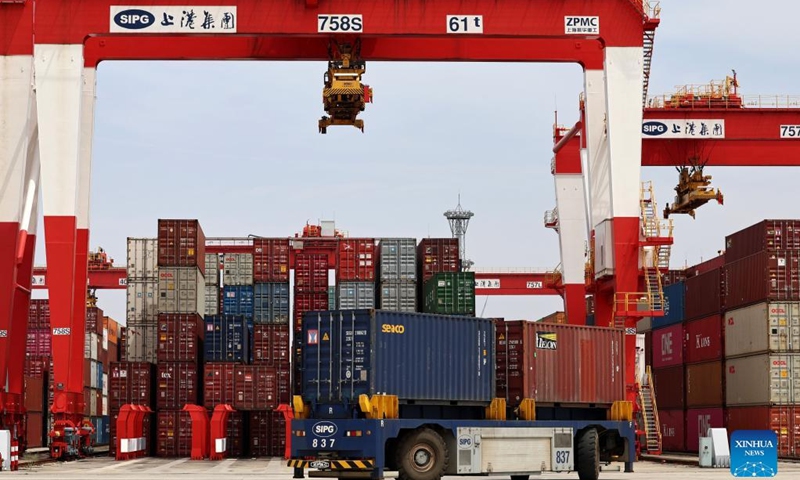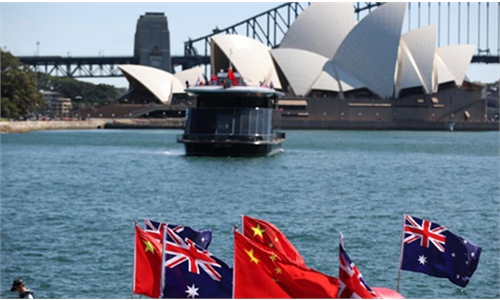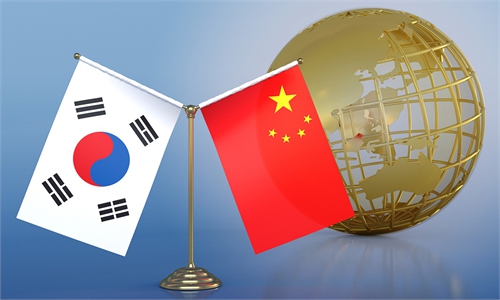
A truck carrying containers is seen at the container dock of Shanghai's Yangshan Port in east China, April 27, 2022. About 25,000 staff members stick to their posts in Shanghai port to guarantee water transportation and improve logistics efficiency amid challenges caused by the recent resurgence of COVID-19 in Shanghai.(Photo: Xinhua)
President Xi Jinping said China is willing to work with other countries to build a global industrial and supply chain system that is secure, stable, smooth, efficient, open, inclusive and mutually beneficial, according to a congratulatory letter the top leader sent to an international forum on supply chain stability on Monday.In the letter sent to the International Forum on Resilient and Stable Industrial and Supply Chains, Xi said that China will unswervingly ensure that the industrial and supply chains are public goods in nature, safeguard the security and stability of its industrial and supply chains, take concrete actions to deepen international cooperation on industrial and supply chains, the Xinhua News Agency reported.
Xi's remarks sent a clear signal about China's unswerving efforts to continue opening up and entrenching its pivotal and central role in global supply chains, at a time when global supply chains have been severely disrupted and the US is doubling down on attempts to pursue a decoupling from China's supply chain, observers said.
The forum, which took place in Hangzhou, capital of East China's Zhejiang Province, opened on Sunday and will last until Tuesday.
The forum has drawn the participation of a plethora of foreign enterprises ranging from US firms such as Qualcomm and Boeing, European firms such as Airbus, BMW and Dassault Group, as well as Japanese firms like Panasonic, according to media reports.
The wide participation is a sign that foreign investors are "voting with their feet" with cooperation momentum in the high-end supply chain taking hold - an ironic and stark contrast to the unilateral efforts that are boasted about by Western politicians, analysts noted.
During the forum, representatives from the US and European business communities highlighted their localization strategies in the world's second-largest economy and spoke of how their businesses have benefited from a resilient Chinese supply chain in the pandemic era.
"Today, we work with more than 30 direct Chinese suppliers, and they have a component role on every commercial airplane Boeing produces. Meanwhile, more than 10,000 Boeing airplanes fly around the world with parts and assemblies built in China," Stanley Deal, president and CEO of Boeing Commercial Airplanes, said at the forum, according to a transcript Boeing sent to the Global Times on Monday.
According to Deal, Boeing has set up a joint venture with Commercial Aircraft Corporation of China, the 737 Completion & Delivery Center in Zhoushan, Zhejiang. It is the first facility of its kind Boeing has built outside the US and a centerpiece of the US aviation company's business strategy in China.
Tian Yun, former vice director of the Beijing Economic Operation Association, told the Global Times on Monday that foreign businesses' positive comments offer a glimpse into their high hopes of achieving closer business ties with China. This is a trend that neither "empty promises" by the Biden administration nor "small sweets" could reverse, Tian said.
"No foreign players would refrain from or withdraw from investing in China, giving the pivotal role the world's largest manufacturer plays in global supply chains, and its prodigious market size, which is estimated to become twice as big as the US in the next decade," Tian said.
China is the largest maker of a host of products and its market size also inspires US companies, Craig Allen, the president of the US-China Business Council, said at the forum, noting that China's supply chain ecosystem also gets a significant boost thanks to its input in basic infrastructure construction and talent creation, according to local newspaper Zhejiang Daily on Monday.
Allen said that most US companies that have invested in China follow the strategy of "in China, for China," and they look forward to building stable and resilient global supply chains together with China.
In a sharp departure from foreign companies' expansion in China, Washington and Brussels have been mulling broader curbs on Chinese industries - ranging from semiconductors and new energy to rare earths and medicine - to fuel further a decoupling with the world's second-largest economy.
On Thursday, US President Joe Biden signed an executive order to strengthen a review of foreign investment in sectors involving sensitive data and cybersecurity, another move targeting Chinese tech development, Reuters reported.
Analysts said that such a Western scheme is doomed to fail and would backfire and leave companies based in those countries caught in the crosshairs of a political gambit.
"China's core role in the global supply chain has withstood pandemic-related disruptions since 2020 and has been further cemented. The ascent of such global standing has also reshaped its role from an assembler of low-skill products, such as textiles and bags, to a provider of high value-added industries such as vehicles," Tian said.




